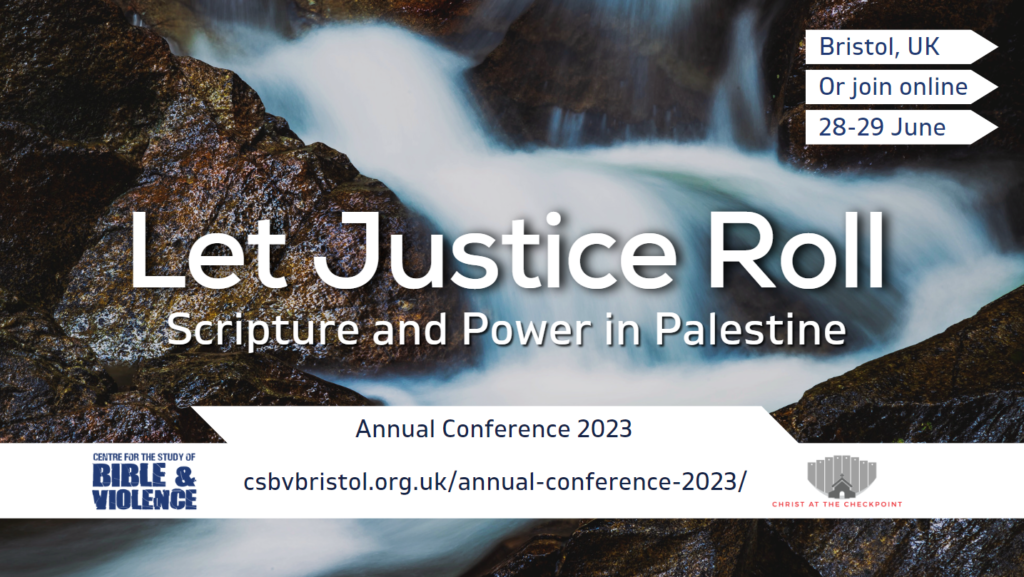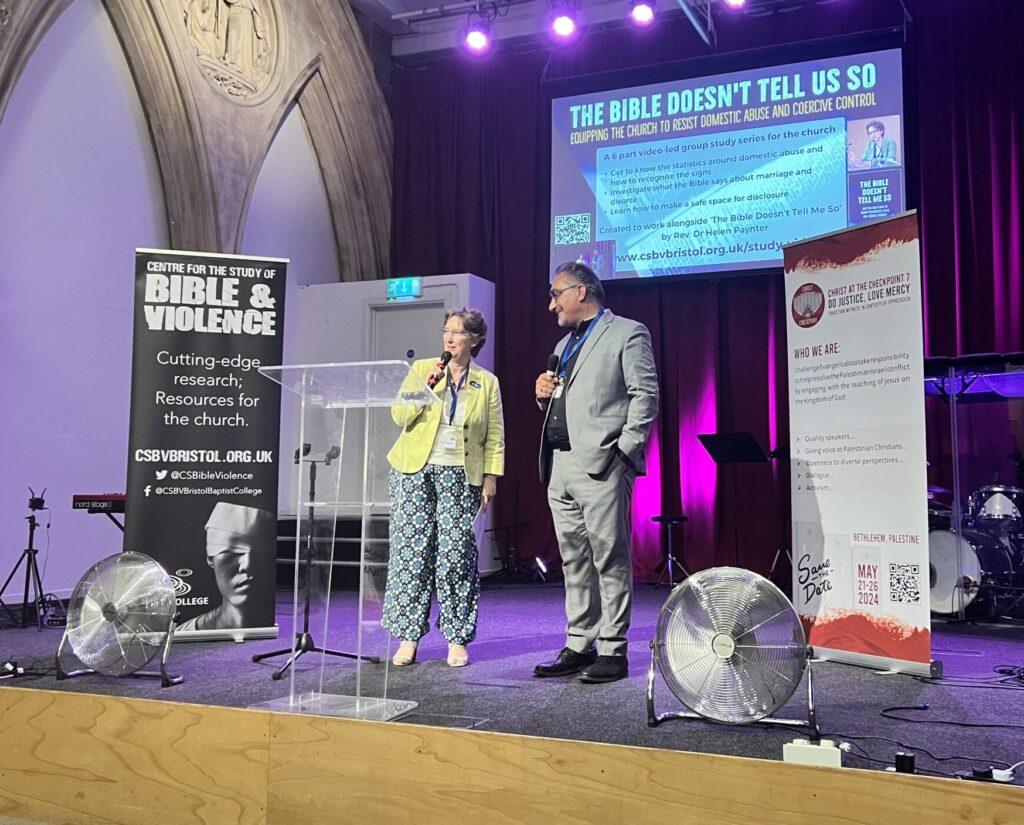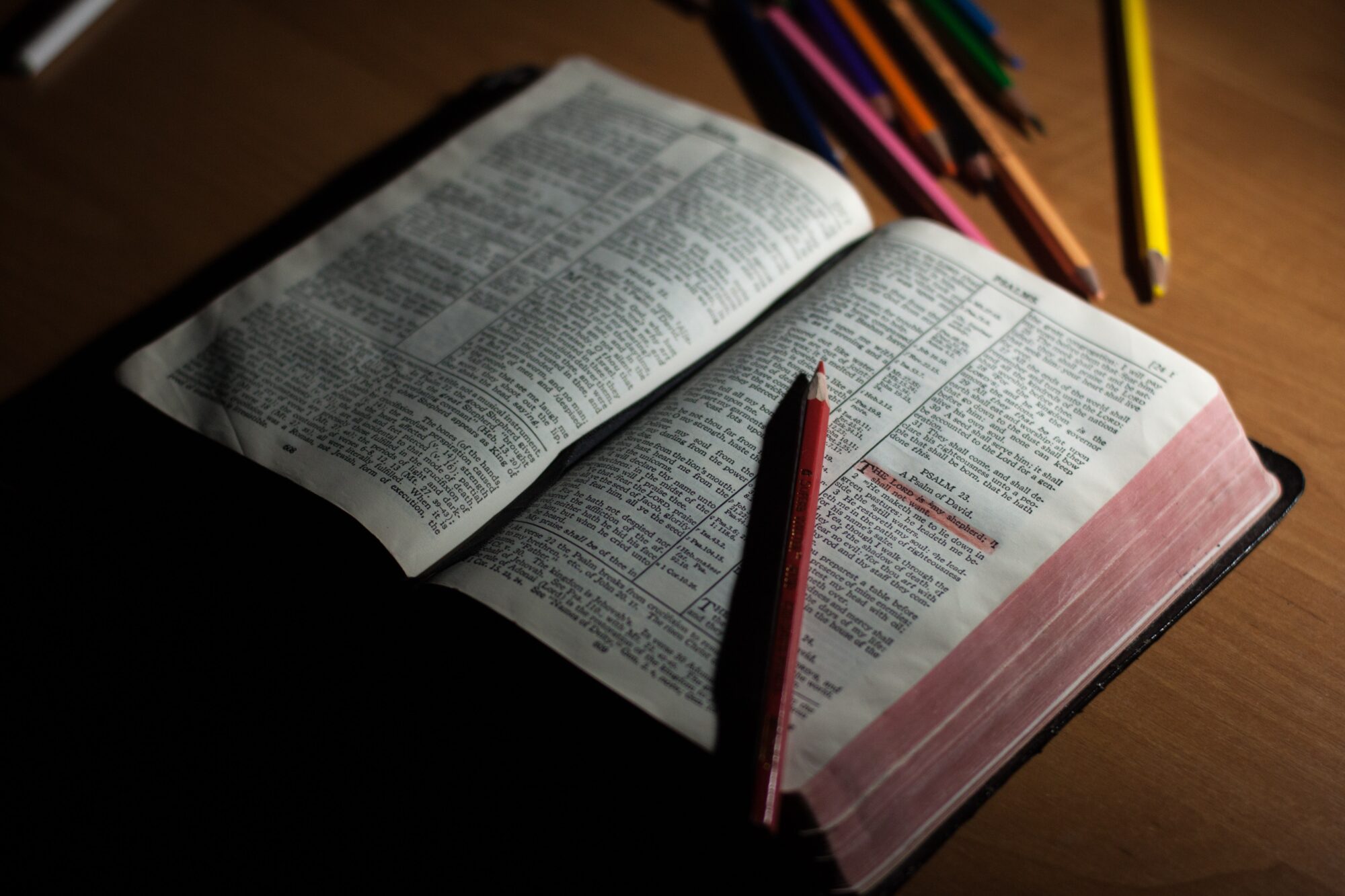Paul reflects on “Let Justice Roll”, the 2023 conference of The Centre for the Study of Bible and Violence. This year the conference was held in partnership with Christ at the Checkpoint, a community of evangelical Christians based at Bethlehem Bible College who explore what Christian discipleship looks like amidst the complexities of the Israeli-Palestinian conflict.

“The interpretation of Scripture matters.”
If a tagline were needed for this year’s CSBV conference, I can think of nothing better.
The phrase belongs to Helen Paynter, who employed it as a refrain throughout her compelling paper on power and interpretation. But it resonated far beyond her talk to emerge as a melody to unite the choir of contributors who harmonised around this year’s theme, “Let Justice Roll”. Whether from a British or a Palestinian perspective, each speaker elaborated on the importance of handling Scripture responsibly. And listening to their diverse voices, I was more alert than ever to the tragedy that can ensue when the Bible is abused, and the good that can be garnered when it is approached with fear and trembling.
As Paynter concluded:
“The interpretation of Scripture matters. When it goes bad, lives are destroyed. When it is performed in humility before the divine author, and in the company of his children, life and truth will break out. And justice will roll.”
If Paynter’s rhetoric is reminiscent of the pulpit, that’s because she is a pastor as well as an academic, ordained in the Baptist Union of Great Britain. This dual calling leaves her well-placed to bridge the academy and the church, something that CSBV was set up to do. A banner on the conference stage declared its twofold purpose: “cutting edge scholarship; resources for the church.” And a look at their website confirms the seriousness of this endeavour. Church leaders will find a plethora of useful resources to promote better Bible reading among the faithful, including a brilliantly named podcast, “Was it something I read?” (Shamelessly appropriated, I’ll admit, as the title for this post!)
This concern to resource the church was reflected, too, in the carefully curated conference programme. Alongside academic papers, we heard “counter stories” from those who have experienced life on the other side of the separation wall. The stereophonic output allowed “Let Justice Roll” to be something more than just another Bible conference. It became a space for incarnational theology; that is, theology rooted in place, where the word is made flesh in the lived experience of the oppressed. In this space, the interpretation of Scripture is made to matter. Readers are compelled to raise a Biblical lens to the injustices of the world and ask what God might have to say.
The Palestinian scholar who shared the stage with Paynter in the opening session was Jack Sara. He is the President of Bethlehem Bible College and a long-time advocate of peace and reconciliation in Israel-Palestine. Like Paynter, he is also a pastor. Indeed, his paper bordered on the sermon at times, titled as it was: “Let us be ambassadors of justice”. In one sense, this rallying cry is nothing unique; a similar appeal might be heard from the pulpit any given Sunday. But differentiating this imperative is the speaker’s history because Sara is one acquainted with injustice. As a Palestinian Christian, he knows full well the harms of bad theology. Indeed, his talk included a warning that anticipated Paynter’s refrain: “Those in positions of power and privilege,” he said, “may be tempted to use their interpretation of Scripture to justify and maintain their status quo or advance their own agenda.”
It is not difficult to decipher what Sara alludes to here. It is a great sadness to Palestinian Christians that the rapid expansion of Israeli settlements in Palestinian territory enjoys a great deal of financial and practical support from Evangelical Christians, most of whom, it should be said, are from the United States. This enthusiasm is fuelled in part by a reading of Scripture that understands the establishment of the state of Israel to be a prerequisite to the second coming of Christ. (For more on this subject, I recommend the documentary film by Israeli journalist Maya Zinshtein, ‘Til Kingdom Come, or read Munther Isaac’s The Other Side of the Wall.) It is a reality that was elaborated by Sara’s colleagues, Munther Isaac and Mitri Raheb. Both men used a computing analogy to describe the appropriation of Scripture for political ends. The military might be the hardware of the occupation, but theology is the software.
And this is the point: the interpretation of Scripture matters. When it goes bad, lives are destroyed.
It is worth noting that Bristol itself is a testament to this reality. The city continues to reckon with its involvement in the transatlantic slave trade. This, of course, made headline news in 2020 when the statue of prominent citizen and slave trader Edward Colston was toppled and thrown into Bristol’s harbour. But fallen statues cannot erase the city’s unhappy history. When the conference ended, I took the opportunity to do some exploring before heading back to Belfast. As I undulated the contours of Bristol’s hilly streets, I found myself wondering how many of the pastel pennant buildings and stained-glass windows owed their existence to the half-million enslaved Africans traded by the city’s merchants. I wondered, too, how many of these slave traders dropped coins into the parish offering plate each Sunday. Whatever the number, it is too many.

But Edward Colston and company aside, the weaponization of Scripture is not to take away from the power of God’s word to liberate the oppressed. Sara, Raheb and Isaac are alive to this potential, just as the descendants of those poor souls traded like cattle in Bristol’s port. The liberating power of Scripture for enslaved Africans has been noted by the Marxist historian Eugene Genovese in his landmark study, Roll, Jordan, Roll. Interestingly, Genovese converted to Christianity after discovering how enslaved Africans paradoxically took up the Book of their oppressors to voice their resistance.
Once again, the interpretation of Scripture matters. When it goes well, life and truth will break out. And justice will roll.
It can be difficult for Western eyes to perceive this dynamic. But read the Bible with the oppressed and it becomes unmissable. At Christ at the Checkpoint, which I attended last year, I heard first-hand what it is like to be a Christian on the other side of the wall. (For more on my experience read here and watch here.) And it was these same voices I got to hear at “Let Justice Roll”, which offered something of a refresher course in hermeneutical humility. Listening to Mitri Raheb, for example, I was struck at how much my understanding is impoverished when I shut myself off from these voices. In his presentation, he pointed out a fact about Scripture that I had never noticed before. The Bible, he observed, was written in the context of empire. Of course! How could I not have seen it before? Whether it was the face of the Egyptians or the Babylonians, the Persians or the Romans, God’s word was spoken to a people under occupation or facing the threat of occupation by another. My Western eyes were blind to this reality, but Raheb’s Palestinian eyes enabled him to see the books of the Bible as, among other things, a direct response to empire. “Texts of creative resistance,” he called them. Counter-stories that break open hegemonies of the powerful.
And it is here that we see the power of Scripture for Raheb and his colleagues today. In the face of oppression, they look to the Bible to assert their resistance to injustice and oppression. And with Palestinian eyes they confront the harmful theology that is assumed (often unconsciously) by many Christians in the West – Christian Zionism. It is worth noting that this ideology is relatively novel, emerging as it did in the late nineteenth century. Although it is used to legitimate the territorial claims of the state of Israel, Christian Zionism is in fact inherently antisemitic, a fact not lost on many Jewish Israelis. It is a sad indictment of the church that such a misappropriation of Scripture does not surprise us. History is redolent with examples of Christians weaponising the Bible against the Jews. And here we must acknowledge that Christian Zionism is not the only harmful theology in town. Just as alarming is the prevalence of supersessionist readings of Scripture. There remains an urgent need to repair the Christian tradition, which has been so complicit in centuries of antisemitism and hatred against the Jews, culminating as we know in the horrors of the Holocaust.
To state it again, the interpretation of Scripture matters. When it goes bad, lives are destroyed.
And so, Bible readers today must be alert to two dangers: Zionism on the one hand and supersessionism on the other. This word of caution is especially apt when it comes to the text that took centre stage at the conference. John Barclay described Romans 9-11 as a hermeneutical minefield. Aware of the potential for grave missteps, Barclay and his Palestinian counterpart, Munther Isaac, traverse Saint Paul’s text with special care. They proved responsible guides, walking us through this challenging terrain fully alert to the pitfalls already mentioned, including those brought to light by the complex situation in Israel-Palestine.
Both treatments were detailed and nuanced, and far too intricate to summarise here. But it is enough, perhaps, to stress again the care with which they handled the text. This in itself was enough to affirm Paynter’s words set out at the beginning: for life and truth to break out, interpretation must be performed in humility before the divine author, and in the company of his children. For Barclay, this means adopting what he described as “a basic Christian hermeneutical principle”, that we interpret the Bible listening to those who have been harmed by the use of it. It’s a point that was reiterated in different terms by Sara Deik. Responding to Barclay and Isaac, she evoked Derrida’s assertion that there can be no ethics without the presence of the other, extrapolating from this that there can be no interpretation without the other.
And this is the challenge I take from “Let Justice Roll”. The interpretation of Scripture matters, and therefore it matters that Scripture is read in the company of others.
But how do we do this? How do we broaden the company of God’s people as we sit in humility before the divine author? Opportunities like CSBV and Christ at the Checkpoint are invaluable, but they are rare. Something else is required if we are to keep attending to the voice of the oppressed. Without a doubt, this must include engagement with those in our own communities who have been displaced. As we look at those who seek refuge in our towns and cities, we might ask how our Bible reading might be enriched (corrected, even) if we were to sit in fellowship with them. What might God have to teach us from our Somalian sister, or our Ukrainian brother? What life and freedom might issue as a result?
And then, of course, there are books. This blog is all about paying attention, and for the most part that means paying attention to what Emma and I encounter on the page. So perhaps my bookshelf needs to diversify too. I have made some moves in this direction in recent years. As a preacher, I have been deliberate in seeking out voices from other places. I have looked on Jesus through Middle Eastern Eyes, navigated Luke with a Jewish and a Christian guide. I have journeyed Acts alert to the insights of Black theology, and asked what it might mean to read from a particular place. And I have left room on the shelf for other voices to be brought into the conversation: The Gospel of John Through Palestinian Eyes; African Commentary on the Bible; Reading the Bible with the Damned.
Other recommendations are gratefully received.
For too long we have neglected these other voices, thinking that we have everything to teach and little to learn. How impoverished we have been.
The interpretation of Scripture matters. So perhaps we should be more alert and attentive to the counter-stories. Because only when we give an ear to these voices are we able to break free from the hegemony of our narrow theology. Scripture is bigger and more capacious than our theological adjectives will sometimes allow.
It takes humility to admit this. But if justice is truly to roll, then humility is exactly what is needed.


